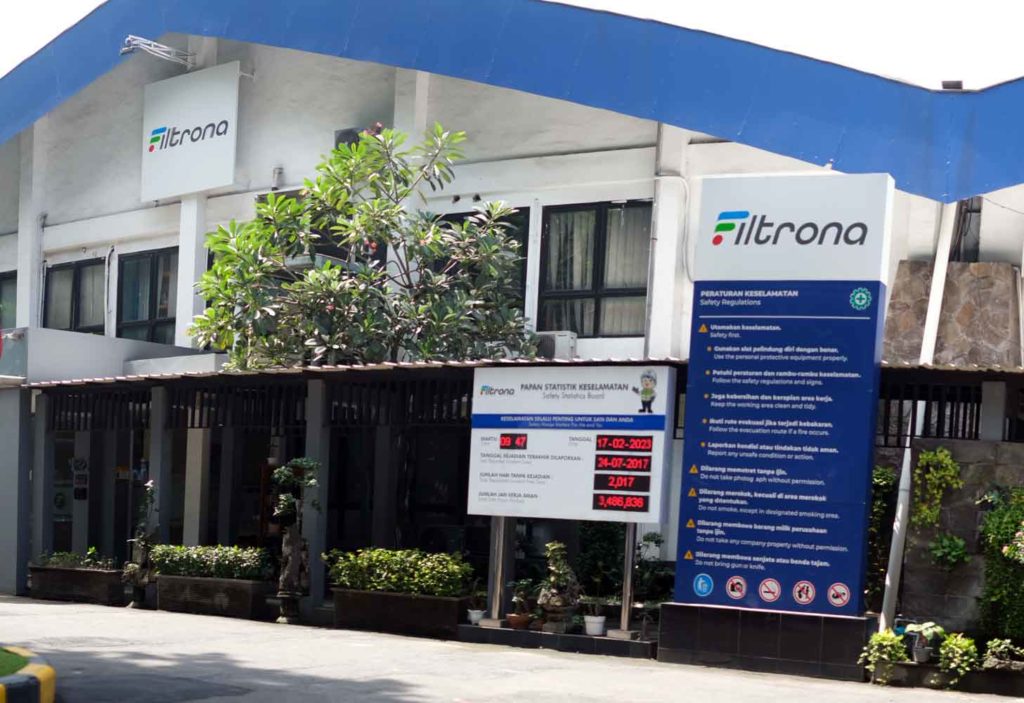A Fresh Start
- Print Edition
- March 1, 2023
- 0
- 9 minutes read

Photo courtesy of Filtrona

After a decade of operating under the Essentra umbrella, Filtrona is back as an independent company.
By Stefanie Rossel
For decades, it was a household name in the tobacco industry. Now it’s back: Filtrona. Having operated as Essentra Filter Holdings since 2013, the specialty filter manufacturer was sold to a private equity firm last year and is now in the process of rebranding.
“The Filtrona name has a rich legacy of innovation supported by strong industry partnerships, so we felt it was only right to build on what our partners were already familiar with,” says Filtrona’s CEO, Robert Pye. “We have developed a new logo and branding program and will be rolling that out in the coming weeks to rejuvenate the brand and give it a modern look and feel.”
The company’s head office will remain in Singapore. Filtrona currently has more than 2,000 employees and is present in 120 markets. The company operates 11 manufacturing facilities across Europe, America and Asia. It also has three innovation centers, an accredited laboratory and a center of excellence focused on sustainability.
According to Pye, 2022 was a “very solid year” for the business despite the challenges involved in completing the sale and unforeseen issues such as the war in Ukraine, which disrupted global supply chains. Pye says the company achieved outstanding double-digit growth last year. Under new leadership, the company’s focus remains on increasing its market share, particularly by expanding in China, Asia, the Middle East and Africa—where the tobacco industry continues to grow—while driving profitability and transforming its business through innovation.

"The Filtrona name has a rich legacy of innovation supported by strong industry partnerships, so we felt it was only right to build on what our partners were already familiar with."
Chinese Venture
In 2020, a filter joint venture (JV) was established with the State Tobacco Monopoly Administration in Xiamen, China, with China Tobacco Fujian Industrial Co. Its shareholders are Essentra (now Filtrona) and three Chinese tobacco companies in Shanghai, Guangxi and Hunan. The JV manufactures specialist filters at the new facility in Xiamen in Fujian province. It is also at this location that a China Development Center for the introduction of advanced filter solutions has just opened.
China is one of the last growth markets for combustible cigarettes. “We are delighted with the progress made at the China JV despite seeing many challenges since we held the opening ceremony in January 2020,” says Pye. “The project has been a remarkable success with commercial operation starting in July 2021, with the China Development Center recently established at the end of 2022. The partnership continues to grow capacity and capability and has already created a promising pipeline of innovative projects serving the Chinese market. We look forward to further growth as we introduce our proprietary filter technology to the market.”
While the tobacco industry is in the midst of an unprecedented transformation with sales of combustible cigarettes stagnating and those of next-generation products rising, Pye sees significant opportunities in the sector. “It is a trillion-dollar* market globally, and we have large market penetration,” he says. “Whilst the total market volume for combustibles is declining, the demand for filter solutions that offer differentiation remains robust. The use of more complex filter specifications continues to grow proportionately in several important markets. Filtrona is also active in the heated-tobacco segment with design, testing and manufacturing of filter solutions. In addition, Filtrona is leading the way forward with sustainable filter solutions, which is becoming increasingly relevant across the tobacco market.”
Filtrona benefits from being the only global, independent partner capable of designing, testing and manufacturing innovative filter solutions, Pye points out, with Filtrona’s laboratory being one of the few globally accredited independent scientific services for tobacco filtration.
“In the past, we had a pivotal role in the setup of standards for combustibles through our accredited laboratory,” he notes. “Today, we are assuming a significant role in the setup of global standards for next-generation products (NGPs), including e-cigarettes and heated-tobacco products.”

Partner in Transition
Aware that the tobacco industry is changing, Filtrona’s vision is to support its partners in their transition by continuing to deliver quality and innovation. As an example, Pye mentions the research and development Filtrona has conducted for its ECO range of sustainable solutions, which are plastic-free and biodegradable. The ECO range includes sustainable solutions for tear tapes used in packaging. The recently launched Rippatape Halo is a paper-based tape for the e-commerce packaging market. “Brands are seeking plastic-free solutions, and Filtrona is delivering on all fronts,” says Pye.
The company appears to be well placed to meet growing demand for plastic-free, biodegradable filters driven by legislation such as the European Union’s Single-Use Plastics Directive (SUPD). While cigarette butts have been exempted from the SUPD for the time being, a provisional agreement in the legislative process encourages the development of sustainable alternatives to tobacco product filters containing plastic through the introduction of extended producer responsibility (EPR), an application of the polluter-pays principle. EU member states have until Dec. 5, 2023, to set up EPR schemes for tobacco filters that contain plastic.
Research conducted by Filtrona reveals that in 75 percent of countries, smokers are more eager to positively impact the environment than the general population. According to Pye, “This gives us significant opportunity to innovate and meet these evolving consumer needs.” Pye adds that Filtrona is investing significantly in paper-based filters with improved sensory performance, specifically taste.
For veterans of the tobacco industry, paper-based filters are a familiar concept; they were standard until the 1950s before the first commercial cellulose acetate filters arrived on the market. “Interestingly, current ECO ranges are loosely based on the first paper filters to arrive on the market, so our long heritage in paper-based filters is highly relevant to the challenge of finding sustainable solutions for today’s market,” says Pye.
“Whilst the total market volume for combustibles is declining, the demand for filter solutions that offer differentiation remains robust.”
Opportunities Ahead
Going forward, Pye expects Filtrona to increasingly focus on consumer customization and modularity. “Capsule flavors are likely to be high on the design agenda, allowing the user to pick type and flavor as well as choosing when to crush the capsule. Japan and South Korea are well-established low-tar markets, with a significant slim/super-slim segment. We see this trend growing in other parts of Asia.
According to Pye, increasing sales of tobacco-heating devices and other NGPs underscore an appetite for innovation that should benefit the company. Filtrona offers a dedicated range of filters for heated-tobacco products.
“Keeping a close eye on new products launching into the market, we see a fresh wave of innovation in areas such as organic, additive-free and sustainable tobaccos. This further underlines and substantiates the relevancy of our ECO range of filters,” says Pye.
Filtrona, he says, is looking forward to supporting its customers to transform and grow. “It’s an exciting time for the industry, and we’re proud to play our part,” Pye says.
*$935 billion, according to Euromonitor

